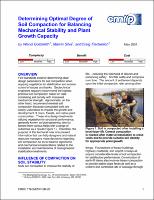Please use this identifier to cite or link to this item:
https://hdl.handle.net/11681/3943| Title: | Determining optimal degree of soil compaction for balancing mechanical stability and plant growth capacity |
| Authors: | Goldsmith, Wendi Silva, Marvin Fischenich, J. Craig, 1962- |
| Keywords: | Plants--Effect of soil compaction on Soil stabilization Growth (Plants) |
| Publisher: | Engineer Research and Development Center (U.S.) |
| Series/Report no.: | Technical Note (Ecosystem Management and Restoration Research Program (U.S.)) ; no. ERDC TN-EMRRP-SR-26 |
| Abstract: | Few standards exist for determining ideal design parameters for soil compaction when applying vegetation for stabilization and erosion control of slopes and banks. Geotechnical engineers regularly recommend the highest practical soil compaction based on data correlating soil density with increased mechanical strength. Agronomists, on the other hand, recommend minimal soil compaction because compacted soils are widely understood to impede the growth and development of crops, forests, and native plant communities. Those who design treatments utilizing vegetation for structural performance, generally known as bioengineering, tend to borrow from various fields with a range of outcomes as a result (Figure 1). Therefore, the purpose of this technical note is to present information that can help designers and natural resource managers make decisions regarding soil compaction so as to balance agronomic and mechanical considerations related to the installation and maintenance of bioengineered stabilization treatments. |
| Description: | Technical Note |
| Gov't Doc #: | ERDC TN-EMRRP-SR-26 |
| Rights: | Approved for public release; distribution is unlimited |
| URI: | http://hdl.handle.net/11681/3943 |
| Appears in Collections: | Technical Note |
Files in This Item:
| File | Description | Size | Format | |
|---|---|---|---|---|
| ERDC-TN-EMRRP-SR-26.pdf | 760.17 kB | Adobe PDF |  View/Open |